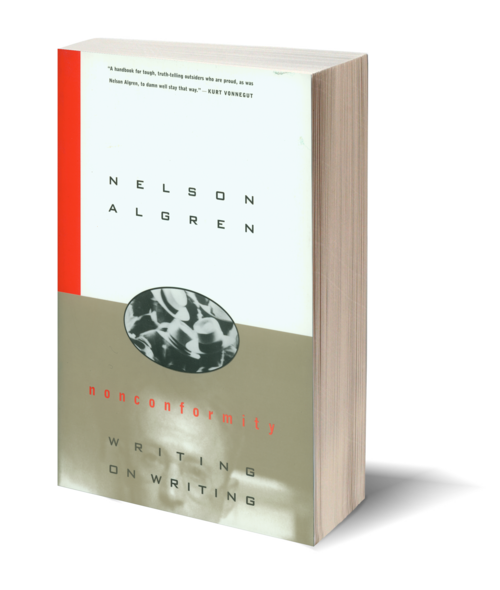Afterword by Dan Simon
Notes by Dan Simon and C. S. O’Brien
Nonconformity is about 20th-century America: "Never on the earth of man has he lived so tidily as here amidst such psychological disorder." It is also about the trouble writers ask for when they try to describe America: "Our myths are so many, our vision so dim, our self-deception so deep and our smugness so gross that scarcely any way now remains of reporting the American Century except from behind the billboards … [where there] are still … defeats in which everything is lost [and] victories that fall close enough to the heart to afford living hope."
In Nonconformity, Nelson Algren identifies the essential nature of the writer's relation to society, drawing examples from Dostoyevsky, Chekhov, Twain, and Fitzgerald, as well as utility infielder Leo Durocher and legendary barkeep Martin Dooley. He shares his deepest beliefs about the state of literature and its role in society, along the way painting a chilling portrait of the early 1950s, Joe McCarthy's heyday, when many American writers were blacklisted and ruined for saying similar things to what Algren says here.
One of America's best loved writers, Nelson Algren won the first National Book Award for Fiction in 1950. But his star faded following harassment by J. Edgar Hoover's FBI during the McCarthy era and changes in literary fashion. Now there's a Nelson Algren revival going on. Colin Asher's epic biography Never a Lovely So Real: The Life and Work of Nelson Algren arrives from Norton in April and is already receiving rave reviews from the likes of the New Yorker.
Seven Stories publisher Dan Simon's essay in the current Nation details why Nelson Algren matters so much—not just as a literary figure, but for us all, right here, right now. According to Simon, Asher's biography "delivers a wrenching portrait of a man who struggled to maintain his sanity and his spirit in a society that was well prepared to see its writers give up or sell out, but struggled to comprehend writers who persevered and paid the price as Algren did."
And speaking of right here, right now, take 75% off all e-books by Algren on the Seven Stories website. Click on any of the books below, or check out the collection right here.
Algren and Kurt Vonnegut were good friends, having taught together at the Iowa Writers' Workshop in 1965–7. See Malcolm Jack's piece in today's New York Times on the 50th Anniversary of Slaughterhouse Five.








-f_medium-759277bc7ccbdddce2099d76797f41a5.jpg)





